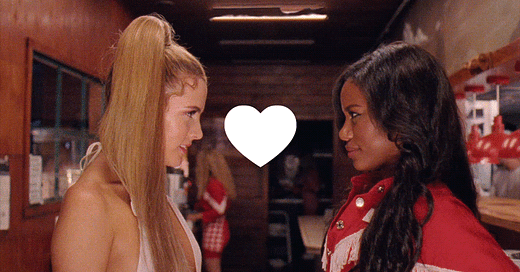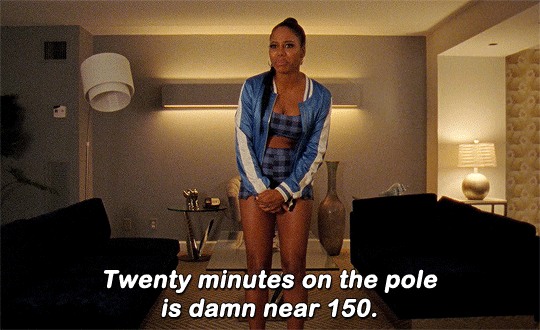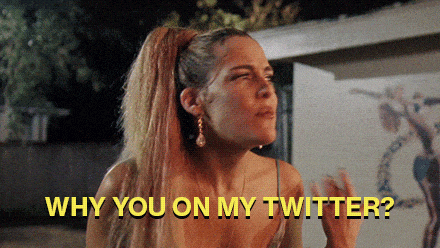Zola (86 minutes)
"You wanna hear a story about how me and this bitch here fell out? It's kinda long, but it's full of suspense."
Welcome back to The 90-Minute Movie - a newsletter for people who ask, “How long is it?” before committing to watching a movie. I’m your host, Amanda, a lover of efficient scripts, bathroom breaks, and the Best Film Editing category at the Oscars. If it’s your first time here, welcome! I hope you’ll stick around.
Life gets in the way of my best intentions, and my humanness is frustrating at times. Movies that I am so excited to see finally get released, and then, for one reason or another, years pass before I actually get in front of them. Zola (2020) is one such movie. It’s been on my list for a while, and it wasn’t until Anora won Best Picture at this year’s Academy Awards that I was reminded I still hadn’t seen it. The argument across Substack and Reddit at the time was “Why Anora and not Zola?” I couldn’t engage properly, and I was embarrassed I hadn’t committed to a film I was once so excited for.
I’m here now.
Zola is the adaptation of 148 tweets that A’Ziah “Zola” King wrote and posted on Twitter in 2015 about a “hoe trip” to Florida turned sex trafficking nightmare. I don’t know how online any of you were in 2015, but these tweets were VIRAL AS HELL at the time. Everyone was talking about them, and major publications started doing deep dives into the “true story”. The in-depth interview David Kushner did for Rolling Stone would go on to serve as a key reference point for screenwriters Janicza Bravo and Jeremy O. Harris.
Zola (Taylour Paige) is working at a restaurant when she meets Stefani (Riley Keough). The two bond over their shared experiences in dancing, and the very next day Stefani invites Zola to dance in Florida. Zola’s down, she’s made lots of money in Florida before, and agrees to join Stefani, Stefani’s boyfriend Derrek (Nicholas Braun), and her “roommate” known as X (Colman Domingo). The trip takes a turn when X posts the women on Backpage (a well-known sex work site) and forces them into a hotel room to wait for men to arrive for sex. Zola refuses but spends the entire night watching Stefani work. The trip continues to get more and more violent and troubling as Zola has to make smart choices to stay safe and eventually get back home.
After I finished the movie, I whipped out my Letterboxd and rated it 4 stars. I enjoyed it. It was fun. The performances are great. But then, as I sat to write this and put my thoughts together, I realized, maybe that wasn’t the case. There was more about it I didn’t like than I had originally thought. (This is why my therapist got me back into journaling. I only really sort myself out with writing.) For one, there is a serious loss of The Zola’s real voice. Paige’s performance is strong, and without the background, great. But when compared to Zola’s original tweets that carry so much energy and humor and fear, Paige’s performance feels flat by comparison. In her tweets, Zola cries, she laughs, she screams.
A Guardian article that tackles the difficulty of turning virality into film points out:
“King’s tweets toggled freely between caps lock and lowercase and blended inner monologue with dialogue in a stream of action. It was candid and irresistibly quotable. […] ‘Pussy is worth thousands. U trippin.’ On screen, the same lines have a surreal airiness.”
Paige’s performance is one of steely resolve. Focus. Like she’s been there before. Again, it works, but it’s not the Zola some of us came to know so well through her writing in 2015. A lot of it falls short.
I dug into this and discovered that initially, Zola wasn’t credited for writing despite her original story (just because it’s on Twitter doesn’t mean anything in my mind, it is still a piece of writing). She took to Twitter again to call out A24 for not giving her a writing credit and for also leaving her off the invitation lists for award ceremonies. It all feels very Hollywood (derogatory). And it brings into question the ownership of stories. Especially lived ones. Once you sell your life story to A24 or, more likely, Netflix, are you supposed to act like it’s no longer yours because men in suits “own” it? In what world does giving someone the right to tell your story mean you’re removed completely from your lived experience? Zola experienced this firsthand and was not quiet about it — she eventually received her credit, which now appears properly on IMDB. It’s worth noting that Zola didn’t blame the other writers. She was impressed with their work. Her problem was solely with the studio.
While generally well-received, Zola, received backlash from organizations and groups for its depiction of sex work. One that stood out to me was the Women Film Critics Circle Awards, which gave the film the 2021 HALL OF SHAME AWARD for “For turning a true cautionary tale about sex trafficking into a dangerous sex farce for the male gaze.” I think this one stuck with me because, hey, I’m a woman and a critic, and I disagree with this sentiment. It’s the kind of thinking that pits feminists against one another. And we saw it again with Anora. The difference here is that Zola is directed by a woman. While Anora is not. I never felt that the camera unnecessarily sexualized Zola or Stefani, and I also would never call this movie a “farce”. This type of uptight second-wave feminism that refuses to see the layers of complexity with sex work doesn’t serve a movie like Zola. And again, we find ourselves with a movie that only works if you have the right context of the viral moment. Without it, you have tonal confusion and performances too nuanced for the average viewer to understand.
(Side note: the heads of these ladies at the WFCC must’ve spun off when they saw Anora!)
So does this mean I will go back and revise my Letterboxd review? Possibly. I think I need to think more deeply about how I rate a movie against its source material. I am an avid reader and often have a hard time with film adaptations, so it’s no surprise to me that I am feeling the way I do about Zola. But all in, Taylour Paige and Riley Keough are doing something special together in this movie. Their chemistry is natural and instinctive. I think they do something that the WFCC felt they could not - and that is bring humanity to a profession that is often met with derision, contempt, and misunderstanding. I applaud the effort… and wow, do I miss Twitter from ten years ago.









Really enjoyed this read, Amanda! I know it's much longer than 90 minutes, but have you written about Anora at all? Interested in your thoughts.
I’m with you on the adaptation struggle. There’s something about knowing the source that makes everything feel slightly off when you finally see it on screen. But I loved your point about how the film almost works on its own terms.